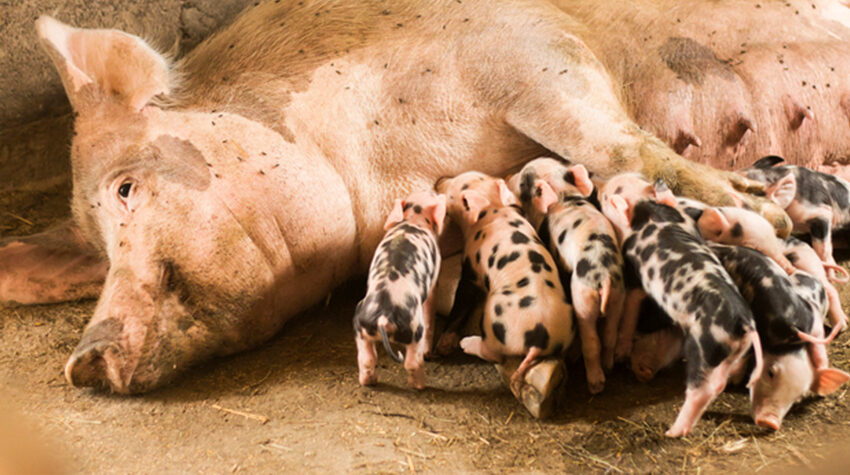
May 11, 2023Media ReleaseThe Supreme Court Upholds California’s Prop 12 Declaring It Serves “Moral Interests.”
For immediate release: 11 May 2023
In a momentous win for the animal protection movement, the U.S. Supreme Court today upheld the constitutionality of California’s farmed animal protection law Proposition 12, which bans the in-state sale of products resulting from the extreme confinement of egg-laying hens, mother pigs, and newborn calves used to produce veal.
Justice Gorsuch wrote for the Supreme Court majority, “While the Constitution addresses many weighty issues, the type of pork chops California merchants may sell is not on that list.” He ultimately concluded, “In a functioning democracy, policy choices like these usually belong to the people and their elected representatives.”
All of the Justices unanimously rejected the pork industry’s claim that Prop 12’s ban on the sale such products is unconstitutional merely because it has indirect effects on out-of-state producers. Justice Gorsuch then was joined by Justices Elena Kagan, Sonia Sotomayor, Clarence Thomas, and Amy Coney Barrett in further voting 5-4 to reject the industry’s secondary claim that the benefits of Prop 12 are outweighed by the negative effects on commerce.
Proposition 12 passed in 2018 with the support of 63% of California voters, due to the efforts of a coalition of animal protection organizations. The Humane Society of the United States led that initiative and then defended the law against multiple meat industry lawsuits all the way through the U.S. Supreme Court. In this case, the National Pork Producers Council and American Farm Bureau Federation challenged the constitutionality of Prop 12, putting at stake the right of California and other jurisdictions to cleanse their local markets of products produced through cruel practices, such as keeping pregnant sows in crates so small that they cannot even turn around or engage in many other natural behaviors.
Harvard Law School’s Animal Law & Policy Clinic contributed to defending Proposition 12 by submitting an amicus brief highlighting the depth of the cruelty involved in producing meat products through intensive confinement practices. The Brooks McCormick Jr. Animal Law & Policy Program also released a major report outlining the potential widespread impacts a negative decision would have had.
Recognizing the Supreme Court hearing as an opportunity to educate the public further about the horrors of factory farming, the Program additionally helped with several media articles about the case in Newsweek, Vox, Ambrook Research, and a major daily in North Carolina, the epicenter of pork production. And the day before the Court heard oral arguments in October, the LA Times published an Op-Ed about the lawsuit co-authored by ALPP Legislative Policy Fellow Kelsey Eberly, ALPP Executive Director Chris Green, and Harvard Law Professor Laurence Tribe—arguably the world’s leading constitutional law scholar who taught the subject to several of the sitting Supreme Court Justices.
Reacting to today’s Supreme Court decision, Clinical Fellow Rebecca Garverman, who worked on the amicus brief with Clinic Director Katherine Meyer, said: “The Supreme Court’s recent ruling on Prop 12 is a resounding affirmation of States’ ability to make moral choices about what ends up on the shelves of in-state stores. With Proposition 12, the citizens of California went to the ballot box to provide overwhelming support for an initiative that bans the products of cruel confinement practices.”
She added: “Justice Gorsuch, author of the Supreme Court opinion, acknowledges the “moral and health interests” behind this law, thus affirming the ability of the populace to use ballot initiatives, such as Prop 12, to communicate their preferences and improve the conditions of animals. This ruling is a win for the animals suffering from intensive confinement conditions but also provides hope for the future to continue to address the suffering of farmed and wild animals throughout the states.”
Clinic Research Assistant Ashton Macfarlane, who was at the Supreme Court for the Prop 12 hearing, said: “It is deeply gratifying to see the Supreme Court recognize states’ moral and federalism interests in enacting laws to advance animal welfare. The opinion is a strong endorsement of such pioneering state efforts, and should embolden states to explore creative and ambitious ways to protect animals. It was an incredible honor to work on this case as a student, and I am thrilled that the Court has reached such a favorable decision for animals and our federal system.”
The Clinic’s amicus brief focused on the animal welfare aspects of the case and included many photographic and video exhibits exposing the harms of extreme confinement. The Clinic filed the amicus on behalf of a coalition of animal protection organizations and law professors that include the San Francisco Society for the Prevention of Cruelty to Animals, The San Diego Humane Society, Marin Humane, Mercy for Animals, Rise for Animals, the Justice for Animals Program at the University of San Francisco’s School of Law, Professor Taimie Bryant at UCLA School of Law, Professor Douglas A. Kysar at Yale Law School, and Professor Rajesh Reddy at Lewis & Clark Law School.
Echoing Garverman’s reaction to today’s ruling, Kelsey Eberly, the former ALPP Legislative Policy Fellow who authored the report, said: “Today’s decision makes clear what should have been obvious to the pork industry: that the Constitution does not privilege their desire to immobilize pigs in narrow cages for the animals’ entire lives, but leaves voters and legislatures free to protect animals, workers, and people’s health by choosing to rid marketplaces of such products of extreme confinement. Those democratic choices can now continue.”
